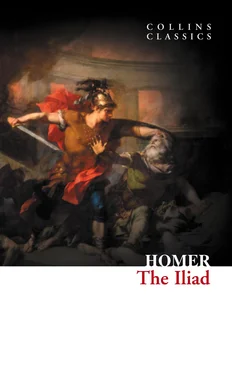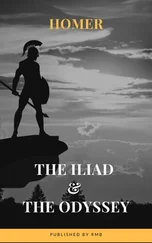Their cliffs above, and ample bay below.
These by the brave Euryalus were led,
Great Sthenelus, and greater Diomed;
But chief Tydides bore the sovereign sway:
In fourscore barks they plough the watery way.
The proud Mycene arms her martial powers,
Cleone, Corinth, with imperial towers,
Fair Araethyrea, Ornia’s fruitful plain,
And Ægion, and Adrastus’ ancient reign;
And those who dwell along the sandy shore,
And where Pellene yields her fleecy store,
Where Helice and Hyperesia lie,
And Gonoessa’s spires salute the sky.
Great Agamemnon rules the numerous band,
A hundred vessels in long order stand,
And crowded nations wait his dread command.
High on the deck the king of men appears,
And his refulgent arms in triumph wears;
Proud of his host, unrivall’d in his reign,
In silent pomp he moves along the main.
His brother follows, and to vengeance warms
The hardy Spartans, exercised in arms:
Phares and Brysia’s valiant troops, and those
Whom Lacedaemon’s lofty hills inclose;
Or Messe’s towers for silver doves renown’d,
Amyclae, Laas, Augia’s happy ground,
And those whom OEtylos’ low walls contain,
And Helos, on the margin of the main:
These, o’er the bending ocean, Helen’s cause,
In sixty ships with Menelaus draws:
Eager and loud from man to man he flies,
Revenge and fury flaming in his eyes;
While vainly fond, in fancy oft he hears
The fair one’s grief, and sees her falling tears.
In ninety sail, from Pylos’ sandy coast,
Nestor the sage conducts his chosen host:
From Amphigenia’s ever-fruitful land,
Where Æpy high, and little Pteleon stand;
Where beauteous Arene her structures shows,
And Thryon’s walls Alpheus’ streams inclose:
And Dorion, famed for Thamyris’ disgrace,
Superior once of all the tuneful race,
Till, vain of mortals’ empty praise, he strove
To match the seed of cloud-compelling Jove!
Too daring bard! whose unsuccessful pride
The immortal Muses in their art defied.
The avenging Muses of the light of day
Deprived his eyes, and snatch’d his voice away;
No more his heavenly voice was heard to sing,
His hand no more awaked the silver string.
Where under high Cyllene, crown’d with wood,
The shaded tomb of old Æpytus stood;
From Ripe, Stratie, Tegea’s bordering towns,
The Phenean fields, and Orchomenian downs,
Where the fat herds in plenteous pasture rove;
And Stymphelus with her surrounding grove;
Parrhasia, on her snowy cliffs reclined,
And high Enispe shook by wintry wind,
And fair Mantinea’s ever-pleasing site;
In sixty sail the Arcadian bands unite.
Bold Agapenor, glorious at their head,
(Ancaeus’ son) the mighty squadron led.
Their ships, supplied by Agamemnon’s care,
Through roaring seas the wondering warriors bear;
The first to battle on the appointed plain,
But new to all the dangers of the main.
Those, where fair Elis and Buprasium join;
Whom Hyrmin, here, and Myrsinus confine,
And bounded there, where o’er the valleys rose
The Olenian rock; and where Alisium flows;
Beneath four chiefs (a numerous army) came:
The strength and glory of the Epean name.
In separate squadrons these their train divide,
Each leads ten vessels through the yielding tide.
One was Amphimachus, and Thalpius one;
(Eurytus’ this, and that Teatus’ son;)
Diores sprung from Amarynceus’ line;
And great Polyxenus, of force divine.
But those who view fair Elis o’er the seas
From the blest islands of the Echinades,
In forty vessels under Meges move,
Begot by Phyleus, the beloved of Jove:
To strong Dulichium from his sire he fled,
And thence to Troy his hardy warriors led.
Ulysses follow’d through the watery road,
A chief, in wisdom equal to a god.
With those whom Cephalenia’s line inclosed,
Or till their fields along the coast opposed;
Or where fair Ithaca o’erlooks the floods,
Where high Neritos shakes his waving woods,
Where Ægilipa’s rugged sides are seen,
Crocylia rocky, and Zacynthus green.
These in twelve galleys with vermilion prores,
Beneath his conduct sought the Phrygian shores.
Thoas came next, Andraemon’s valiant son,
From Pleuron’s walls, and chalky Calydon,
And rough Pylene, and the Olenian steep,
And Chalcis, beaten by the rolling deep.
He led the warriors from the Ætolian shore,
For now the sons of OEneus were no more!
The glories of the mighty race were fled!
OEneus himself, and Meleager dead!
To Thoas’ care now trust the martial train,
His forty vessels follow through the main.
Next, eighty barks the Cretan king commands,
Of Gnossus, Lyctus, and Gortyna’s bands;
And those who dwell where Rhytion’s domes arise,
Or white Lycastus glitters to the skies,
Or where by Phaestus silver Jardan runs;
Crete’s hundred cities pour forth all her sons.
These march’d, Idomeneus, beneath thy care,
And Merion, dreadful as the god of war.
Tlepolemus, the sun of Hercules,
Led nine swift vessels through the foamy seas,
From Rhodes, with everlasting sunshine bright,
Jalyssus, Lindus, and Camirus white.
His captive mother fierce Alcides bore
From Ephyr’s walls and Selle’s winding shore,
Where mighty towns in ruins spread the plain,
And saw their blooming warriors early slain.
The hero, when to manly years he grew,
Alcides’ uncle, old Licymnius, slew;
For this, constrain’d to quit his native place,
And shun the vengeance of the Herculean race,
A fleet he built, and with a numerous train
Of willing exiles wander’d o’er the main;
Where, many seas and many sufferings past,
On happy Rhodes the chief arrived at last:
There in three tribes divides his native band,
And rules them peaceful in a foreign land;
Increased and prosper’d in their new abodes
By mighty Jove, the sire of men and gods;
With joy they saw the growing empire rise,
And showers of wealth descending from the skies.
Three ships with Nireus sought the Trojan shore,
Nireus, whom Aglae to Charopus bore,
Nireus, in faultless shape and blooming grace,
The loveliest youth of all the Grecian race;
Pelides only match’d his early charms;
But few his troops, and small his strength in arms.
Next thirty galleys cleave the liquid plain,
Of those Calydnae’s sea-girt isles contain;
With them the youth of Nisyrus repair,
Casus the strong, and Crapathus the fair;
Cos, where Eurypylus possess’d the sway,
Till great Alcides made the realms obey:
These Antiphus and bold Phidippus bring,
Sprung from the god by Thessalus the king.
Now, Muse, recount Pelasgic Argos’ powers,
From Alos, Alope, and Trechin’s towers:
From Phthia’s spacious vales; and Hella, bless’d
With female beauty far beyond the rest.
Full fifty ships beneath Achilles’ care,
The Achaians, Myrmidons, Hellenians bear;
Thessalians all, though various in their name;
The same their nation, and their chief the same.
But now inglorious, stretch’d along the shore,
They hear the brazen voice of war no more;
No more the foe they face in dire array:
Close in his fleet the angry leader lay;
Since fair Briseis from his arms was torn,
The noblest spoil from sack’d Lyrnessus borne,
Then, when the chief the Theban walls o’erthrew,
Читать дальше












